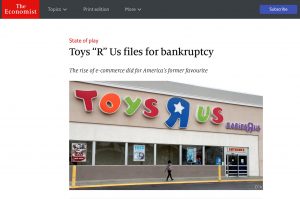
You may have read recently, that iconic Toys R Us is filing for Bankruptcy. So what happened? While many may easily blame the usual decline in retail business, the REAL reason is because Toys R Us did not adopt a win win, collaborative mindset that is so vital to success in the 21st century Global Economy.
Toys R Us had the chance to lead all online toy sales from the very beginning and were on the path to doing so, but they threw it all away because of their scarcity mindset!
As early as 1999, in the middle of the dotcom boom, when the Toys R Us website was so successful it was flooded with toy orders and couldn’t ship to all customers in time, they decided to seriously invest in their online sales.
Within two months, they announced a deal to be Amazon’s exclusive toy supplier. Within a year, the partnership with Amazon led to ToysRUs being the world’s top toy site.
Soon after they announced their partnership, Jeff Bezos launched Amazon Marketplace, which allowed anyone to sell anything on their site. To the winner-takes-all mentality of companies like Toys R Us, this was unacceptable.
Other retailers began selling toys not available in Toys R Us, giving customers greater choice. Toys R Us CEO, John Eyler, flew out to meet Jeff for an emergency meeting to force him to stop them.
Jeff said “someone ought to be able to find everything” on Amazon – and that by giving more choice to the customer, everyone wins. He pointed to the ongoing increase in Toys R Us sales as a result, and said they hadn’t broken their agreement as none of these new toys were available on Toys R Us anyway.
Jeff added, if they wanted more control, why not increase their product range? Amazon would then happily make them the exclusive seller on all of the new products they offered as well.
Instead, Toys R Us sued Amazon for beach of contract. He got a restraining order to try and prevent Amazon selling any other toys on their site. Amazon countersued for “chronic failure” to carry stock of the toys customers wanted.
The court case dragged on for five years and eventually Amazon settled with a $51 million payment to get out of the fight. Toys R Us may have won the battle, but their lost the war.
Toys R Us took their toys and tried to compete with Amazon (and the rest of the Internet) with their own exclusive site. It failed!
Amazon sales went from $2.78 billion when the Toys R Us deal was first struck, to $8.49 billion when Toys R Us sued, to $136 billion last year, making it the fastest company in history ever to reach $100 billion in sales.
Toys R Us flat lined on $11 billion in sales in 2016 – the same level of sales they had ten years earlier. Saddled with $5 billion in debt, this week Toys R Us filed for bankruptcy.
What set the two companies apart? It wasn’t that one was online and one was offline. It was that one was willing to change, and one wasn’t. The difference is that Amazon has an abundance (win win mentality) whereas Toys R Us had a Win Lose (Scarcity Mentality).
Leave A Comment